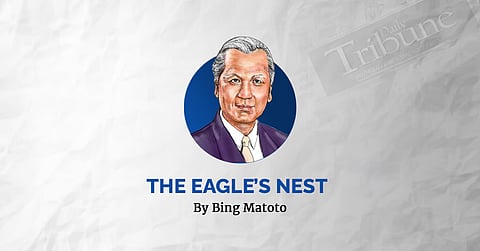
- NEWS
- the EDIT
- COMMENTARY
- BUSINESS
- LIFE
- SHOW
- ACTION
- GLOBAL GOALS
- SNAPS
- DYARYO TIRADA
- MORE

Did you know that Vietnam, the relatively new kid on the block among the ASEAN stock exchanges which was founded only in 2000, has now vastly outpaced the Philippine Stock Exchange, an oldie among the regionals founded in 1927, in terms of listed companies, stock trading volume and trading values? The PSE has 280 listed stocks compared to 830 in Vietnam. So far, PSE’s trading volume in 2025 in trade value is about $300 million while Vietnam has already reached $500 million.
How did this happen? Well, the obvious answer is there are more choices for investors in Vietnam with 830 companies to choose from as against only 280 companies in the Philippines.
Unfortunately, this yawning gap will likely grow even larger this year. Our local market has so far in 2025 only the Top Line IPO to speak off plus probably expected blockbusters GCash and Maynilad before the year is over compared to the number of offerings in Vietnam, about 40, that are expected to continue swelling over the next few years due to a slew of positive market developments and synchronized reforms that have been introduced by the Hanoi Stock Exchange (HNX) and the Vietnamese government, particularly on enhanced shareholder protection, transparency, and streamlining of administrative procedures.
For instance, HNX has reduced the listing process to only 30 days compared to the previous lengthy 90 days eliminating the delay due to the separation of the IPO proper from the subsequent listing. Furthermore, Vietnam’s reciprocal tariff with the US which will now be only at 20 percent compared to the initial 46 percent declared by Trump.
Processing initiatives include an electronic communication platform between brokerages and custodian banks; a new trading platform that enhances trading speed and settlement reliability; a consolidated account framework to simplify foreign transactions; elimination of the pre-funding requirement of foreign institutional transactions; enhanced trade allocation procedures; and a central counterparty clearing system. With all these initiatives, the HNX is imminently expecting Vietnam to be upgraded to Emerging Market status in the FTSE Russell index.
Compare this to the Philippine situation. We were at 10-percent tariff prior to Trump’s “Liberation Day” declaration which we thought would be adjusted to 17 percent or even lower due to our “special” relationship with the US, only to see ourselves hit with a 19-percent tariff of all Philippine exports to the US.
For the processing of IPOs, if all goes well—meaning no lengthy back and forth questions and answers with the PSE and the SEC—according to the PSE timeline, the whole process should theoretically take no longer than 12 weeks. But of course, that’s on paper.
Realistically, based on my recollection of my underwriting days, the whole process usually took much, much longer than 90 days. Easily five to six months, particularly for large IPOs due to foreign underwriters’ participation which would entail roadshows abroad and bookbuilding to gauge the market appetite before any firm underwriting commitments were made.
This article, however, will not be complete without a reference to corruption and its appalling, deleterious effects on society, the hapless citizenry, the economy, particularly the capital markets and the perception of foreign investors.
In Vietnam, news about the recent judgement to execute Truong My Lan, a billionaire businesswoman, and the swift conviction of several of her relatives and associates and public officials sent a clear message that in an autocratic society, retribution will come swiftly compared to a democratic country like ours which will take an interminable period of time to render justice to the guilty.
Our current headlines are replete with news of how a select few contractors in apparent collusion with key officials of the DPWH, the bureaucracy overseeing the infrastructure industry, and elected legislators have caused disastrous damage to our country.
I believe the current public mood is one of helpless frustration with the governance of our nation; utter disgust over the unconscionable, ostentatious flaunting of wealth borne out of corruption of the nouveau riche; and loathing for conniving, supposed public servants of the people.
Already there are signs of dangerous simmering public unrest and worrisome whispered talk even among the educated middle class that our democratic system is not working and that it may be time to shift gears on what form of governance is needed in order to rid us of corruption.
Let’s hope the ongoing crackdown will not be just all bluster.
Until next week… OBF!
